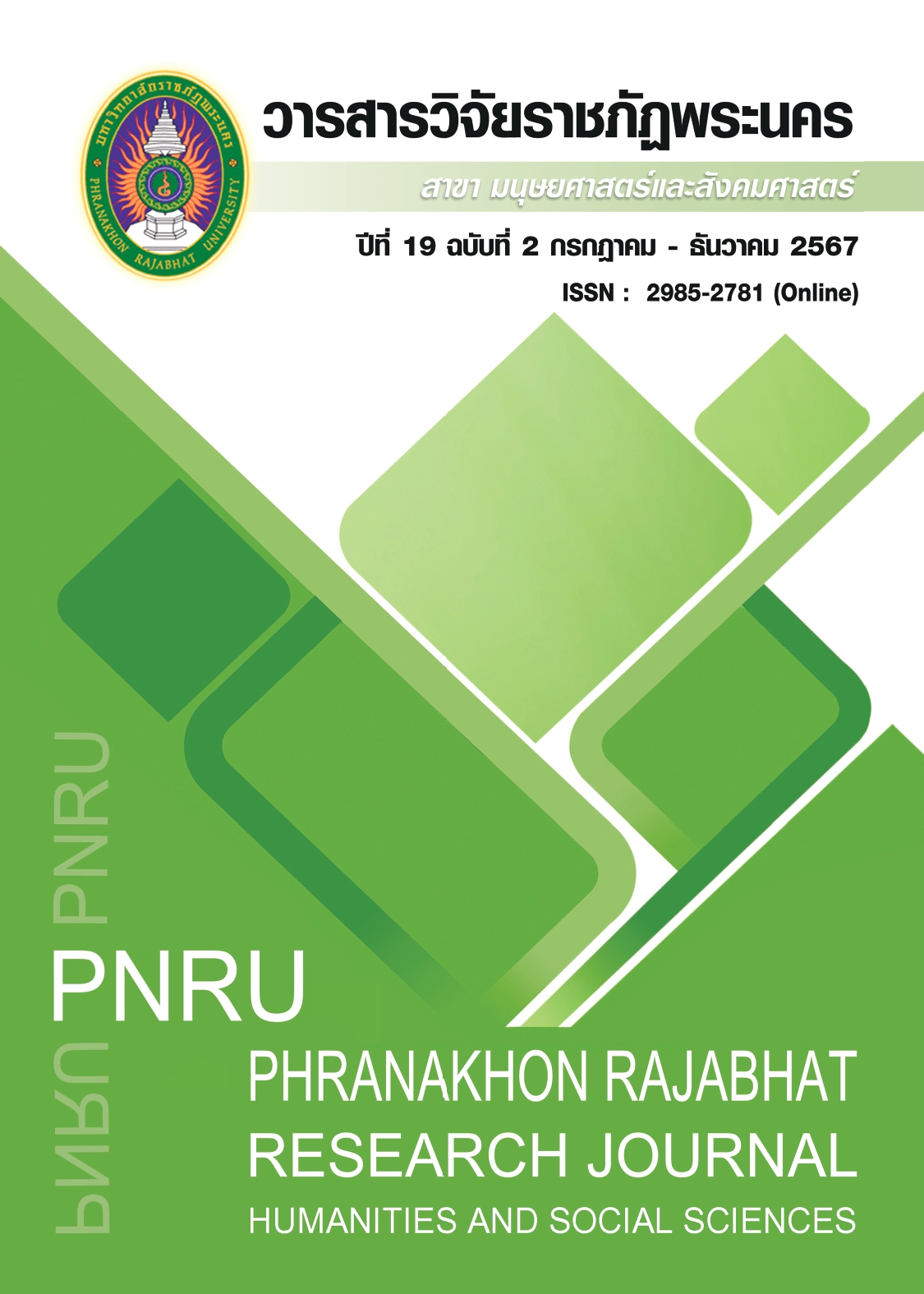DESSERTS IN TRADITION “HEET 12 KONG 14”: THAI PHUAN SOFT POWER ACCORDING TO THE KING’S PHILOSOPHY ENHANCE ETHIC TOURISM, NAKHON NAYOK PROVINCE
Main Article Content
Abstract
This article is part of the King's Philosophy Project of the Communication Arts Department, Phranakhon Rajabhat University 2023 and integration of research, teaching, academic services and arts and culture services. The objective is to convey stories about dessert food in traditional merit-making ceremonies of Thai Phuan ethnic group, Nakhon Nayok Province that now continuing. It is a type of soft power that can be easily published to cultural tourists. By mainly merit-making events in Heet Sib Song (merit-making events in every each month in year), there will be special food and desserts prepared for each merit making event that requires the cooperation of people in community such as Khao Lam (sticky rice and coconut milk cooked in bamboo tube) in Bun Khao Lam Duean Ai (merit making event in first month), Khao Jee Phuan (fried pancake from sticky rice flour with coconut and sesame filling) in Bun Khao Jee Duean Sam (merit making event in the third month), Krayasart (stied dessert from mixing grains and sugar) in Bun Khao Sa Duean Kao (merit making event in the ninth month) and Khao Mao (dessert from steam young rice grain and grated coconut) in Bun Khao Mao Duan Sib Song (merit making event in the twelfth month) Including Khanom Khao Krayaku (stir dessert from young rice milk and sugar), Khanom Kab Moo (stir dessert from rice flour and pork fat). The Thai Phuan desserts are considered special foods that are prepared for only the traditional merit-making ceremonies. Therefore, "desserts" can be considered as a distinct food identity of Thai Phuan ethnic group. It is related to their way of life, traditions and beliefs. The identity of desserts in traditional merit-making events can be further developed into a creative economy, to promote ethnic tourism and is classified as an outstanding soft power.
Article Details

This work is licensed under a Creative Commons Attribution-NonCommercial-NoDerivatives 4.0 International License.
Each publish articles were copyright by Phranakorn Rajabhat University
Any contents which appeared in each articles in the journal were authors personal opinion. It did not relate to Phranakorn Rajabhat University and other instructors in the university. Each authors would take responsibility on their articles. If there are any mistake, the authors will take responsibility themselves
References
Attacharoenwong, N. (2022, 2 Dec.). Beliefs of Thai Phuan ethnic Nakhon Nayok Province. President of Thai Phuan Hand Weaving Center, Nakhon Nayok Province.
Boonchoi, A. (n.d.). Khanom Khap Moo. Nakhon Nayok provincial Cultural Office. Retrieved from https://www2.m-culture.go.th/nakhonnayok/ewt_dl_link.php?nid=571 [2023, 12 Jan.]
Chaloem Rat Museum. (2023). Thai Phuan in Pak Phli. Nakhon Nayok Province. Thailand.
Chanruang, C. (2021). What is Soft Power? Retrieved from https://www.bangkokbiznews.com/blogs/columnist/968174. [2023, 12 Jan.]
Community Organization Development Institute. (2018). Khao Jee Festival: Thai Phuan way, 2018. Retrieved from https://web.codi.or.th/20180226-3727/ [2023, 1 May.]
Ethnic Groups in Thailand. (n.d.). Ethic group: Thai Phuan. Retrieved from https://ethnicity.sac.or.th/database-ethnic/?search=txt&txt=ไทยพวน. [2023, 11 Feb.]
INNEWS. (2023). A good story about the tradition of making merit with Khao Lam and giving blessings to the Lao Puan rice fields. Retrieved from https://www.innews.news/news.php?n=38431 [2023, 29 Dec]
Klomdet, S. (2022). Khao Yaku : a dessert reflects culture and religion that is difficult to find. Retrieved from https://krua.co/food_story/thai-dessert_yakul/ [2023, 12 Jan.]
Localicious. (2019). Khanom Khap Moo. Retrieved from https://www.facebook.com/photo/?fbid=2298920680204552&set=pcb.2298920903537863 [2022, 5 Dec.]
MICE Intelligence Team. (2022). Designing for a Local Experience. Retrieved from https://intelligence.businesseventsthailand.com/th/blog/designing-for-a-local-experience-ยกระดับอาหารท้องถิ่น. [2023, 27 Dec.]
Ministry of Culture. (2013). Tradition of burning Khao Lam. Retrieved from http://www.m-culture.in.th/album/view/175291/. [2023, 29 Dec.]
Ministry of Culture. (2023). Culture Calendar: Bun Khao Mao Traditional Festival. Retrieved from https://calendar.m-culture.go.th/events/101734. [2023, 1 May.]
Nadee, P. (2017). The cultural uniqueness of Tai Puan influencing local tourism at Pak Phi, Nakhonnayok. EAU Heritage Journal, 7(1), 61-69. (in Thai).
Naewheangtham, R. (2017). The guideline of the local wisdom product development for promote creative economy in Nakhon Pathom Province. Veridian E-Journal, Silpakorn University 10(1), 994-1013. (in Thai).
Nakhon Nayok Province. (n.d.). Sart Phuan tradition Nakhon Nayok Province. Retrieved from https://www.stou.ac.th/offices/rdec/nakornnayok/main/onlineexhibitions/Nakhon%20nayok/Nakhon-NayokPage4.html. [2022, 5 Dec.]
Office of the Royal Society. (2010). Khao Yaku. Retrieved from legacy.orst.go.th/?knowledges=ข้าวยาคู-๓๐-ธันวาคม-๒๕๕๓. [2023, 12 Jan.]
PaNu. (2022). Krayaku. Entrepreneurs. Occupational group Pak Phli district, Nakhon Nayok Province.
Princess Maha Chakri Sirindhorn Anthropology Centre (SAC). (n.d.). Thai Phuan and it legacy. Retrieved from https://thehumans.sac.or.th/sac/curated/23. [2022, 4 Dec.]
Princess Maha Chakri Sirindhorn Anthropology Centre (SAC). (2016). Local traditions in Thailand: Sart Phuan. Retrieved from https://www.sac.or.th/databases/rituals/detail.php?id=80. [2022, 8 Dec.]
Ruedeeniyoomwut, C. (2021). Whai is Soft power? Soft power Isn’t always soft mind-blowing power capture the hearts of people around the world. Retrieved from https://www.brandthink.me/content/whatissoftpower. [2023, 12 Jan.]
sapannga31. (2021). Thai Phuan community travel guide for tourist. Retrieved from https://pubhtml5.com/nmwn/dgxq/basic/. [2023, 1 May.]
SDG MOVE. (2021). UNWTO announces 44 names of sustainable tourism villages for the Best Tourism village award for the year 2021. Retrieved from https://www.sdgmove.com/2021/12/06/https-www-unwto-org-tourism-villages-en-news-unwto-list-of-best-tourism-villages-2021/ [2023, 14 Apr.]. (In Thai)
Subhong, K. (2018). Participation process in the revival of “FON THAI PHUAN” in the Thai Phuan community in the Nakhon Nayok Province. Master of Education (Art Education). Faculty of Fine Arts, Srinakharinwirot University. (In Thai).
Sukhothai Thammathirat Open University. (n.d.). Thai Phuan. Retrieved from https://www.stou.ac.th/Offices/rdec/nakornnayok/Main/OnlineExhibitions/Thaiphun/StoryMain.html. [2022, 28 Dec].
Thai Dictionary.com. The meaning of Khao Mao. Retrieved from https://พจนานุกรมไทย.com/2-819-ความหมาย-ข้าวเม่า%20๑%20.html. [2023, 1 May].
Thailand Science Research and Innovation (TSRI). (2021). Culture heritage and the creative economy: Soft power for sustainable development. Retrieved from https://drive.google.com/file/d/1gETE7HCm6HlNSl6jSULghYujSdtL8-CO/view. [2023, 27 Dec.]
Thai Phuan Club of Thailand. (2019), Kayasart. Retrieved from ttps://www.facebook.com/profile/100057239117792/search/?q=กระยาสารท&locale=th_TH [2023, 30 Dec.]
Thairath online. (2023). “Songkran” the intangible cultural heritage of human. Retrieved from https://www.thairath.co.th/news/local/2747129. [2023, 27 Dec.]
Thirawat, S. (2022). Soft Power in Roy ruen muang thai. Bangkok: National Assembly Library of Thailand. (In Thai).
Tourism and Creative Economy (PMUC). (2023). Driving the strategy of 12 months, 12 festivals towards a mechanism for developing the creative economy and Lanna Soft Power. Retrieved from https://www.facebook.com/CoordinatorOfTourismAndCreativeEconomy/ [2023, 14 Apr.]. (In Thai)


